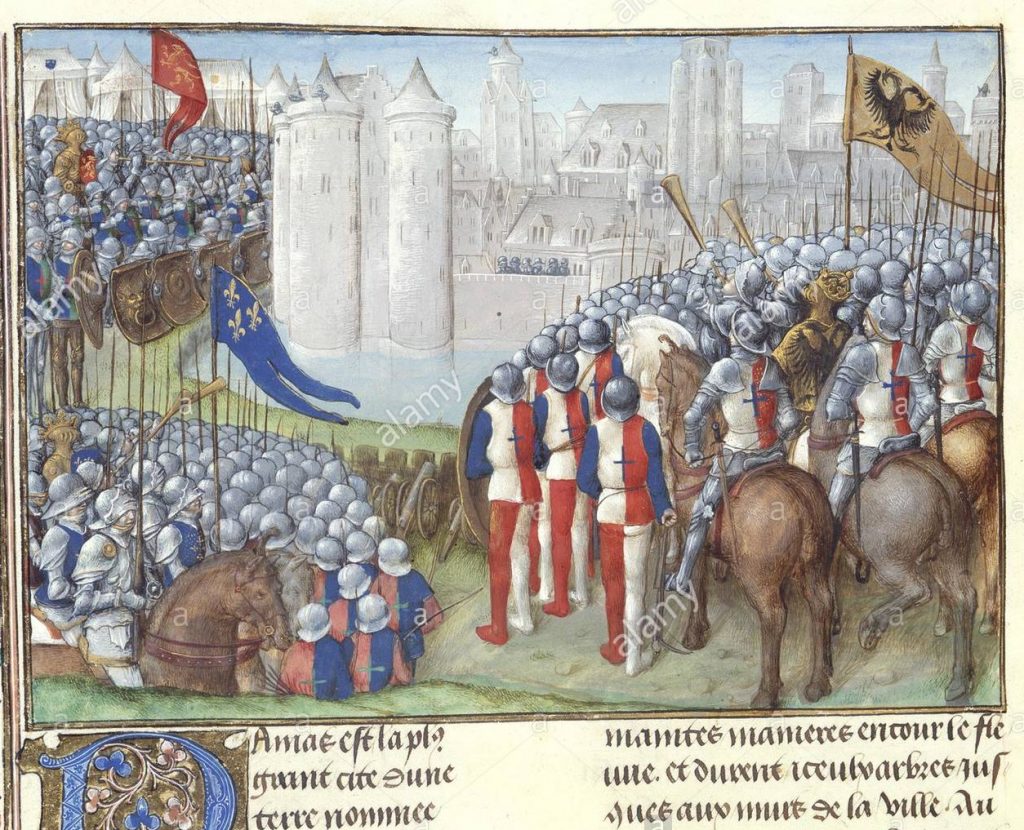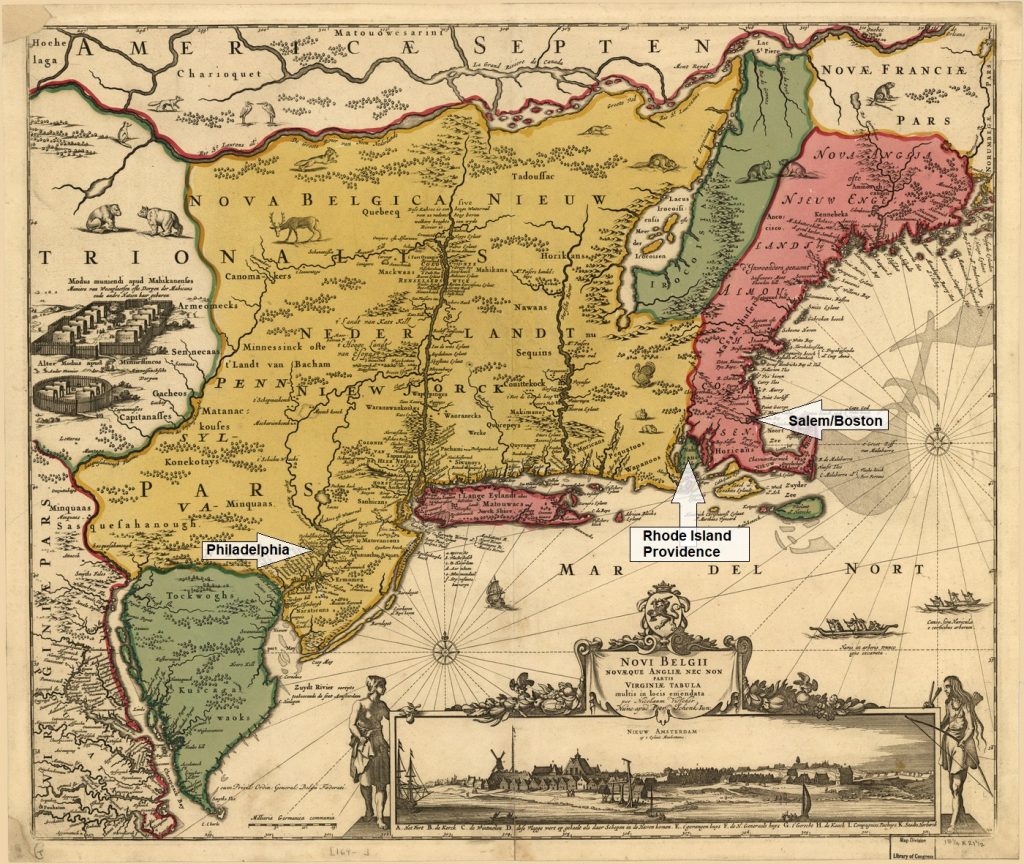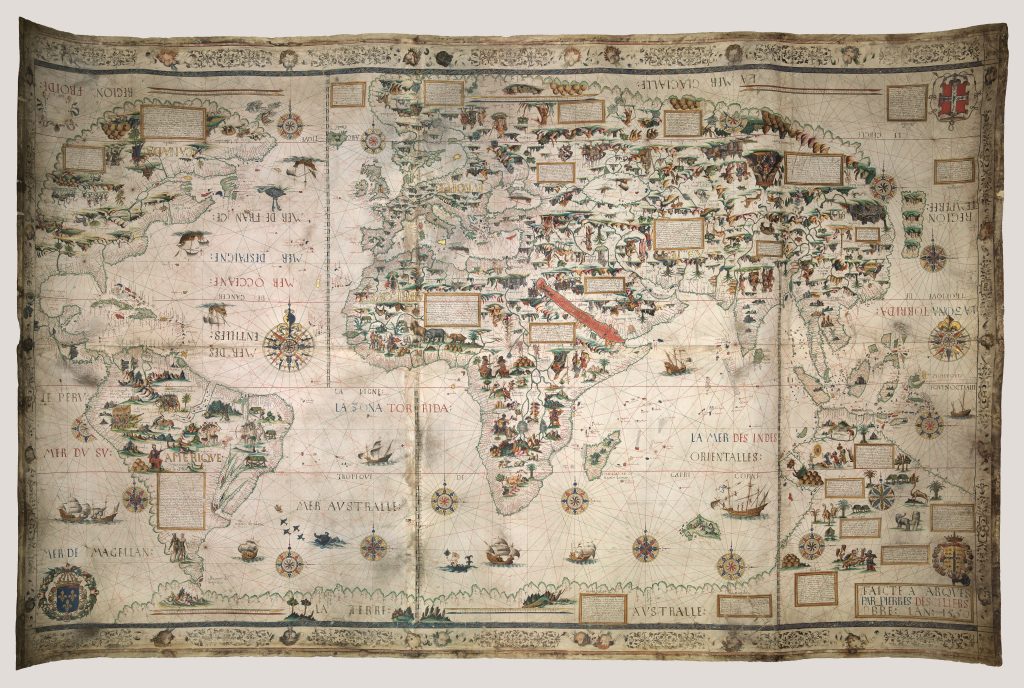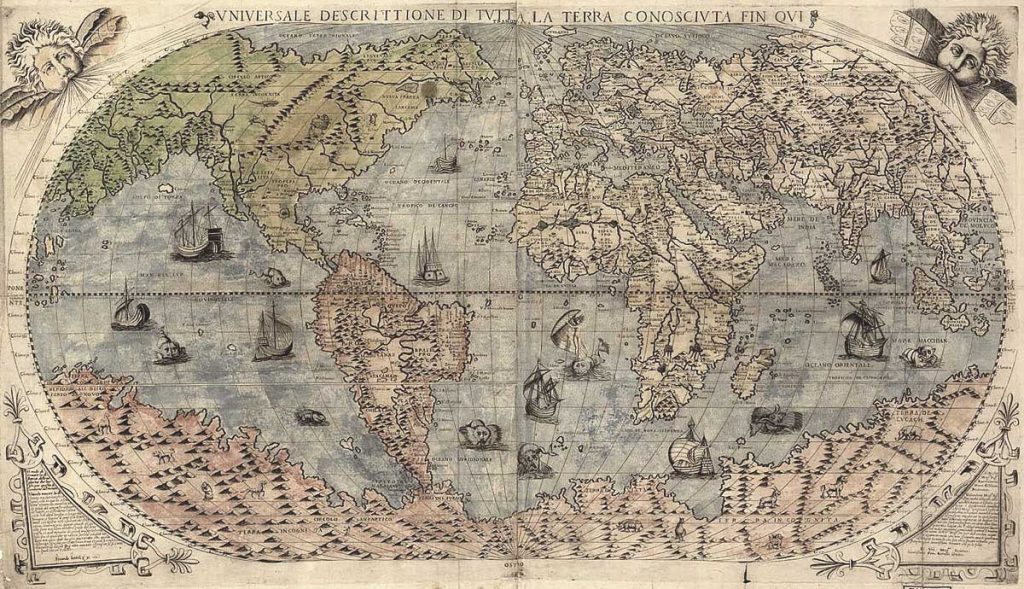Inhoudsopgave
Anonymous Chronicle of the Crusade, the story of the ‘two clerics who wanted to preach to the sultan’
SOURCE: Chronique d’Ernoul et de Bernard le Trésorier, ed. L. de Mas-Latrie (Paris, 1871), ch. 37, pp. 431–5; English translation copied from : Johan V. Tolan, Saint Francis and the Sultan.
Voor een samenvatting in het Nederlands klik hier
The AUTHOR is probably a layman in the entourage of the king of Jerusalem, John of Brienne.
The TEXT is called the “Chronique d’Ernoul et de Bernard le Trésorier”. A misleading title, since the narration of the two clerics’ mission was written neither by Ernoul nor by Bernard. This ‘Chronicle’ has survived in the form of continuations added to a French translation of William of Tyre’s Chronicle of the crusades, the Historia rerum in partibus transmarinis gestarum, who had related the history of the Holy Land from Muhammad to 1184. William’s chronicle was translated into French in the first quarter of the thirteenth century (so very close to the events narrated here); To some of these translations a number of other texts are added (in French: les continuations), apparently compiled by well informed members of the lay nobility of the kingdom. Start reading below the image.

The story of the two clerics who wanted to preach to the sultan
Now I am going to tell you about two clerics who were among the host at Damietta. They came before the Cardinal (= Pelagius, Bishop of Albano and Legate of the Apostolic See, who challenged the command of John of Brienne, King of Jerusalem, claiming that the Church held greater authority than a secular leader), saying that they wished to go preach to the Sultan, but that they did not want to do this without his leave. The Cardinal told them that as far has he was concerned, they would go there neither with his blessing nor under his orders, for he would never want to give them permission to go to a place where they would only be killed. For he well knew that if they went there, they would never come back. But they responded that, if they were to go there, he would have no blame, because he had not commanded them, but only allowed them to go. And thus they begged the Cardinal incessantly. When he saw that they were firm in their resolve, he told them: ‘Sirs, I do not know what is in your hearts or in your thoughts, whether these be good or evil, but if you do go, see that your hearts and thoughts are always turned to the Lord God.’ They responded that they only wanted to go to accomplish a great good which they longed to carry to its conclusion. Then the Cardinal said it was indeed good for them to go if they wished, but that they were not to let anyone think that he had sent them.
And so the two clerics then left the Christian camp and headed towards that of the Saracens. When the Saracen sentinels saw them coming, they thought that they were messengers or perhaps had come to renounce their faith. When they met them, they seized them, and led them to the Sultan. When they were brought into his presence, they greeted him. The Sultan returned their greeting and then asked if they wished to become Saracens or perhaps had come with some message. They responded that they would never want to become Saracens, but that they had come before him as messengers on behalf of the Lord God, that he might turn his soul to God.
‘If you wish to believe us,’ they said, ‘we will hand over your soul to God, because we are telling you in all truth that if you die in the law which you now profess, you will be lost and God will not possess your soul. It is for this reason that we have come. But if you will give us a hearing and try to understand us, we will demonstrate to you with convincing reasons, in the presence of the most learned teachers of your realm, if you wish to assemble them, that your law is false.’
The Sultan responded that he had qâdîs and good clerics of his Law (The original reads: caadiz et bon clers de lor loi. The chonicler apparently had enough knowledge about islam to know that a qâdî was a muslim judge. Idem his supposed/intended readers!), and that he could not listen to what they had to say except in their presence. ‘Very well,’ responded the two clerics, ‘order them here, and if we cannot demonstrate with solid arguments that what we tell you is true, that your law is false—that is, if you are willing to listen and understand—then you can have our heads cut off.’ So the Sultan ordered them to join him in his tent. And so some of the highest nobles and wisest men of his land and the two clerics were gathered together. When they had all assembled, the Sultan explained the reason why he had called them together and brought them into his presence, and what the two clerics had said, and the purpose they had in coming to his court. But they answered him: ‘Lord, you are the sword of the law (tr. of ‘Saîf al-Dîn) : you have the duty to maintain and defend it. We command you, in the name of God and of Muhammad, who has given us the law, to cut off their heads here and now, for we do not want to listen to anything they have to say. We also warn you not to listen to them, because the law forbids giving a hearing to preachers. And if there should be someone who wishes to preach or speak against our law, the law commands that his head be cut off. It is for this reason that we command you, in the name of God and the law, that you have their heads cut off immediately, as the law demands.’
Having said this, they then took their leave and departed, without wanting to hear another word. There remained only the Sultan and with the two clerics. Then the Sultan said to them: ‘My lords, they have told me in the name of God and of the law that I should have your heads cut off, because it is so prescribed. But I am going to act against the law, because I am never going to condemn you to death. For that would be an evil reward for me to bestow on you, who conscientiously risked death, as you believe, in order to save my soul for God.’ After saying this, the Sultan told them that if they wished to remain with him, he would give them vast lands and many possessions. But they replied that they did not want to stay, from the moment they saw that he did not want to listen to them or understand their message, and that they would return to the Christian army, if he would permit them. The Sultan replied that he would gladly have them returned safe and sound to the Christian camp. Furthermore, he brought great quantities of gold, silver, and silk garments and invited them to take whatever they wanted. They said that they would take nothing, since they could not have his soul for God, for it was in their eyes more valuable to them than all that he possessed. They said it would be sufficient if he would give them something to eat, and then they would be on their way, since they couldn’t accomplish anything else there. The Sultan gave them plenty of food to eat, whereupon they took their leave of him and he had them escorted safely back to the Christian army.
Samenvatting (Nederlands)
Het verslag lijkt te zijn gebaseerd op het verhaal zoals het in het kruisvaarderskamp zelf is beleefd/verteld. Belangrijk: De auteur is geen geestelijke, maar een militair. Hij geeft blijk van kennis van islamitische titulatuur en gebruiken: de term voor islam-geleerde: qâdî, komt letterlijk in de tekst voor en het ambt van de sultan als opperrechter Saîf al-Dîn wordt letterlijk vertaald in de tekst: ‘het zwaard van de wet’.
Twee tamelijk eigenzinnige bedelmonniken verschijnen in het kamp. Ondanks dat ze geen toestemming krijgen van de commander in chief (kardinaal Pelagius) besluiten ze toch naar de sultan te gaan. Ze willen hem overtuigen van de superioriteit van het christelijk geloof. Ze worden meteen gearresteerd en voorgeleid. Bij de sultan aangekomen, verkondigen ze luid en duidelijk dat de ziel van de sultan zal verloren gaan als hij zich aan zijn wetten houdt. Ze willen met hun moslim-collega’s een debat over de ware godsdienst. De qâdîs, islamgeleerden en raadslieden van de sultan, reageren verontwaardigd en eisen de doodstraf verwijzend naar hun wetten en Mohammed. De sultan blijkt grootmoediger dan zijn adviseurs en probeert de beide monniken nog te verleiden om te blijven door ze geschenken aan te bieden. Als ze die resoluut weigeren, stuurt hij ze onder militaire begeleiding terug naar het kamp van de kruisvaarders.
 ‘Onze Lieve Heer op zolder’ is de negentiende eeuwse naam van de schuilkerk die de rooms-katholieken in de zeventiende eeuw inrichtten op de zolder van een groot (gecombineerde) herenhuis aan de Amsterdamse Oudezijds Voorburgwal. Van binnen een kerk, van buiten niets bijzonders te zien.
‘Onze Lieve Heer op zolder’ is de negentiende eeuwse naam van de schuilkerk die de rooms-katholieken in de zeventiende eeuw inrichtten op de zolder van een groot (gecombineerde) herenhuis aan de Amsterdamse Oudezijds Voorburgwal. Van binnen een kerk, van buiten niets bijzonders te zien.
 Peter Berger (1929-2017) was een invloedrijk godsdienstsocioloog. Zijn boek uit 1967 The Sacred Canopy vestigde zijn naam op dit terrein. In dit boek combineerde hij de secularisatiethese van Weber met zijn eigen visie op religies als ‘sociale constructies’. Al snel zag hij de blikvernauwing. In de jaren 1990 stelde hij dat Moderniteit leidt tot pluraliteit (als feit) op religieus terrein en dus tot de vaststelling dat men niet meer op dezelfde manier religieus kan zijn als vroeger, nl. vanzelfsprekend. Dit kan vervolgens zowel tot relativitering als tot fundamentalisering van het religieuze leiden. Secularisatie is dan een optie (Europa), maar geen dwingend gevolg.
Peter Berger (1929-2017) was een invloedrijk godsdienstsocioloog. Zijn boek uit 1967 The Sacred Canopy vestigde zijn naam op dit terrein. In dit boek combineerde hij de secularisatiethese van Weber met zijn eigen visie op religies als ‘sociale constructies’. Al snel zag hij de blikvernauwing. In de jaren 1990 stelde hij dat Moderniteit leidt tot pluraliteit (als feit) op religieus terrein en dus tot de vaststelling dat men niet meer op dezelfde manier religieus kan zijn als vroeger, nl. vanzelfsprekend. Dit kan vervolgens zowel tot relativitering als tot fundamentalisering van het religieuze leiden. Secularisatie is dan een optie (Europa), maar geen dwingend gevolg.


 Olivier Roy (
Olivier Roy (








 Maurice Merleau-Ponty (1908-1961).
Maurice Merleau-Ponty (1908-1961).